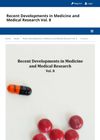 1 citations,
January 2009 in “Elsevier eBooks”
1 citations,
January 2009 in “Elsevier eBooks” Anorexia Nervosa and Bulimia Nervosa are complex eating disorders with increasing incidence among young females, significant morbidity, and varying mortality rates, requiring more research for better treatment.
January 2020 in “Proyecto de investigación:” Longer anogenital distance may indicate a higher chance of having polycystic ovary syndrome, and measuring this distance along with hormone levels could improve diagnosis.
54 citations,
October 2010 in “Clinics in dermatology” Diet, especially dairy and high-sugar foods, can cause acne.
51 citations,
August 2012 in “Differentiation” Mouse genital development depends on male or female hormones for specific features.
 50 citations,
March 2001 in “Clinics in Dermatology”
50 citations,
March 2001 in “Clinics in Dermatology” Genes and hormones cause hair loss, with four genes contributing equally.
 15 citations,
January 2002 in “Gynecological endocrinology”
15 citations,
January 2002 in “Gynecological endocrinology” Hormones affect skin aging and fat distribution, and treatments can help, but only minoxidil is proven for female hair loss.
 42 citations,
March 2008 in “Molecular and Cellular Endocrinology”
42 citations,
March 2008 in “Molecular and Cellular Endocrinology” Hormones and neuroendocrine factors control hair growth and color, and more research could lead to new hair treatment options.
 April 2022 in “Brazilian Medical Students”
April 2022 in “Brazilian Medical Students” People with androgenetic alopecia may have a higher risk of severe COVID-19.
 January 1987 in “Journal of steroid biochemistry/Journal of Steroid Biochemistry”
January 1987 in “Journal of steroid biochemistry/Journal of Steroid Biochemistry” Norethisterone (jenapharm) therapy is effective for endometrial cancer.
August 2021 in “Journal of The American Academy of Dermatology” Newer contraceptives with less androgenic progestins may reduce female hair loss.
 24 citations,
May 2010 in “Hautarzt”
24 citations,
May 2010 in “Hautarzt” Different hormones affect hair growth and conditions, with some causing hair loss and others promoting it.
 5 citations,
September 2016 in “Journal of Cosmetic Dermatology”
5 citations,
September 2016 in “Journal of Cosmetic Dermatology” Nourkrin® with Marilex® may increase hair count by 35.7% in postpartum hair loss.

Androgenetic alopecia, or hair loss, is caused by a mix of genetics, hormones, and environment, where testosterone affects hair growth and causes hair to become smaller and grow for a shorter time.
 November 2016 in “Elsevier eBooks”
November 2016 in “Elsevier eBooks” Genetic mutations can affect female sexual development, requiring personalized medical care.
 153 citations,
March 2017 in “Endocrine”
153 citations,
March 2017 in “Endocrine” Male pattern baldness involves genetics, hormones, and needs better treatments.
 44 citations,
March 2004 in “Journal of Investigative Dermatology”
44 citations,
March 2004 in “Journal of Investigative Dermatology” The effects of estrogen on human hair growth are unclear and need more research.
 36 citations,
October 2021 in “Frontiers in Endocrinology”
36 citations,
October 2021 in “Frontiers in Endocrinology” Insulin resistance and high male hormone levels are major causes of Polycystic Ovary Syndrome.
 2 citations,
November 2013 in “Elsevier eBooks”
2 citations,
November 2013 in “Elsevier eBooks” Hormones control reproduction and are crucial for body balance.
 January 2009 in “Springer eBooks”
January 2009 in “Springer eBooks” The document concludes that managing skin conditions during pregnancy is important and requires specialized care.
 91 citations,
August 2015 in “Anais Brasileiros De Dermatologia”
91 citations,
August 2015 in “Anais Brasileiros De Dermatologia” Female Pattern Hair Loss affects women's self-esteem and needs more research for better treatment.
 68 citations,
March 1965 in “The BMJ”
68 citations,
March 1965 in “The BMJ” Hormones and genetics affect hair growth and patterns, with some changes reversible and others not.
 55 citations,
January 2007 in “Climacteric”
55 citations,
January 2007 in “Climacteric” Menopause and aging can affect women's quality of life and sexuality, but hormone therapies may help alleviate these issues.
 22 citations,
May 2000 in “American Journal of Clinical Dermatology”
22 citations,
May 2000 in “American Journal of Clinical Dermatology” Treatments for common hair loss include minoxidil, finasteride, and hair transplantation.
 9 citations,
January 2019 in “Postepy Dermatologii I Alergologii”
9 citations,
January 2019 in “Postepy Dermatologii I Alergologii” The skin acts like an endocrine organ, making hormones that affect skin diseases and respond to stress.
 2 citations,
November 2012 in “InTech eBooks”
2 citations,
November 2012 in “InTech eBooks” The document concludes that sex hormones are crucial for mammalian reproduction, health, and behavior, and require more research for therapeutic use.
 1 citations,
January 2017 in “Current Dermatology Reports”
1 citations,
January 2017 in “Current Dermatology Reports” Early baldness in men may indicate risks for obesity, metabolic syndrome, insulin resistance, and heart disease, similar to women with PCOS. Alopecia areata is often linked with autoimmune diseases and mental health issues. Certain hair disorders are due to genetic issues, and chemotherapy can cause hair loss through specific biological pathways. Iron deficiency's link to hair loss is still disputed.
 October 2021 in “Book Publisher International (a part of SCIENCEDOMAIN International)”
October 2021 in “Book Publisher International (a part of SCIENCEDOMAIN International)” Antioxidants and growth factors may help treat hair loss when combined with LED and Laser therapy.
 January 2019 in “International Journal of Pharmacognosy and Clinical Research”
January 2019 in “International Journal of Pharmacognosy and Clinical Research” Mexican medicinal plants are used to treat hair loss.
Researchers created a new mouse model, G4, that mimics human PCOS symptoms and links the condition to a specific gene.
 July 2015 in “Cambridge University Press eBooks”
July 2015 in “Cambridge University Press eBooks” Androgens like testosterone affect skin health and can lead to conditions such as acne and hair loss, with various treatments available.
























